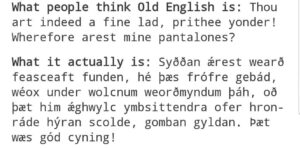Saturday, March 24th, 2018...5:40 pm
Old English Is Older than Old English That is Old New English
Jamie Maclean

Image: Facebook
“Hey what classes are you taking this year?”
“A course in Old English.”
“You mean like Shakespeare?”
“No, from way before that.”
This conversation is one I, (and many an English student) have had. Among the General Public it seems that “Old English” refers to thees and thous and Olde tymy spelyng. Before I started writing this post I took an informal survey to see just how widespread this belief was. While I could have done this by speaking to random people or ambushing unsuspecting students in the Arts tunnel, I instead went to the deepest depths of the internet and posed by question to the one place where I knew I would get a variety of answers: Reddit.
On the subreddit “AskReddit” I asked “What first comes to mind when you hear “Old English?” While the thread wasn’t as popular as I’d hoped it be (getting only 28 comments, compared the hundred or thousands other questions got), the answers I did get shows how much peoples’ conceptions about Old English differ. The highest rated answer was one that simply said Beowulf (which is not surprising as reading/studying Beowulf is common in High School and college), while others mention the usual answer of “ye olde” and “thou” while others mention a couple drinks, Sheep Dogs and other miscellaneous things, such as the insult “you egg,” (Reddit) which is a phrase used in MacBeth:
“FIRST MURDERER (Stabbing him) What, you egg? / Young fry of treachery!” (MacBeth)
So the question now has to be asked: Why is Old English viewed this way? Well, for one thing pop culture has a tendency to spread the misconception of Old English as nothing but Shakespeare and a few modern words with bad spelling, to the point where there’s even a trope associated with this called “Ye Olde Butcherede Englishe” which the page says: “ This doth makest the characters soundeth like idiots complete to any viewer that possesseth pon a verse of uni degree… especially if it goest on for long passages. Zounds!” (TVTropes). By simply reading this sentence it would be easier to say what it got right than what it got wrong and what it got right was “doth” which is not even an Old English word (according to OED entry for “do” it comes from 1850). Everything else is simply a modern word with a “th” on the end or something with no clear origin (“zounds”). While the page actually does explain why this is wrong, the very fact that this exists shows how common the misconception of Old English is. This faux Old English called Gadzookery (thank you TVtropes for that word) is common, but things like this are not unique for pop culture. There are also misconceptions such as how spies and secret agents actually operate thanks to things like James Bond or or bending and breaking the rules on Science for the cases of Drama as seen in Star Trek. While it can be frustrating at times to see these things be misrepresented, all we can really do is watch with a smile and be aware that we have to correct people about Shakespeare time and time again.
Works cited:
“Facebook.” Steve the vagabond and silly linguist, www.facebook.com/stevethevagabond/posts/1572657279460222.
“Macbeth.” SparkNotes, SparkNotes, nfs.sparknotes.com/macbeth/page_154.html.
“What first comes to mind when you hear “Old English?” • r/AskReddit.” Reddit, www.reddit.com/r/AskReddit/comments/82fegu/what_first_comes_to_mind_when_you_hear_old_english/.
“Ye Olde Butcherede Englishe.” TV Tropes, tvtropes.org/pmwiki/pmwiki.php/Main/YeOldeButcheredeEnglishe.
Comments are closed.